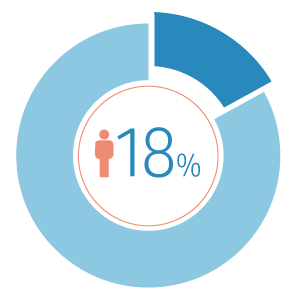
Anxiety Therapist in Los Angeles, CA
Are you struggling with anxiety and feeling overwhelmed?
You are not alone.

*Anxiety affects 40M adults every year, about 18.1% of the population.
Millions of people around the world are affected by anxiety, which is a prevalent mental health condition. According to the Anxiety and Depression Association of America (ADAA), anxiety disorders are one of the most common mental illnesses in the United States. It affects 40 million adults, which amounts to 18.1% of the population every year. Fortunately, there is help available. The Beverly Hills Therapy Group provides tailored anxiety therapy services to aid you in managing your symptoms and enriching your quality of life. Our experienced anxiety therapists in Los Angeles, CA, provide you with the support and guidance you need to learn the effective coping mechanisms and skills it takes to overcome anxiety.
Different Types of Anxiety
Each type of anxiety disorder can often require a slightly different approach.
Generalized Anxiety Disorder (GAD)
Think of Generalized Anxiety Disorder (GAD) as a constant state of worry. People with GAD are constantly on edge, expecting the worst. They worry about various aspects of their lives, leading to physical symptoms like fatigue, headaches, and muscle aches.
Panic Disorder
Panic Disorder is like a sudden, intense wave of fear and anxiety. It can strike without warning, causing heart racing, sweating, and difficulty breathing. It can be a terrifying experience.
Social Anxiety Disorder (Social Phobia)
Social Anxiety Disorder is characterized by extreme nervousness in social situations, particularly around unfamiliar people. It can disrupt daily life, leading to blushing, sweating, and communication difficulties.
Specific Phobias
Specific Phobias entail an intense fear of a particular thing or situation, such as flying, heights, spiders, needles, or blood. These fears can significantly impact daily functioning.
Obsessive-Compulsive Disorder (OCD)
OCD involves intrusive, repetitive thoughts and behaviors that individuals struggle to control. They may feel compelled to repeat specific actions, like hand washing or checking locks, to alleviate anxiety.
Post-Traumatic Stress Disorder (PTSD)
PTSD is a haunting condition triggered by a traumatic event, causing distressing thoughts, memories, and nightmares. Individuals may feel as if they are reliving the event.
Separation Anxiety Disorder
Separation Anxiety Disorder is a fear of separation from home or loved ones. It is more common in children but can affect adults too. It involves fear of being alone or away from attachment figures.
Agoraphobia
Agoraphobia is a condition characterized by an intense fear of environments or scenarios that might cause panic attacks. It involves a fear of feeling trapped, helpless, or embarrassed in specific settings, such as crowded malls or busy streets.
Causes of Anxiety

Different Types of Anxiety Therapy in Los Angeles
If you’re someone who struggles with anxiety, you know how challenging it can be to manage those symptoms on your own. Fortunately, The Beverly Hills Therapy Group offers a variety of therapeutic techniques that can help you get back on track and start feeling like yourself again.
Cognitive Behavioral Therapy (CBT):
This form of therapy focuses on identifying, addressing, and changing maladaptive thought processes and behaviors.
Dialectical Behavior Therapy (DBT)
This therapy approach is an extension of CBT, focusing more on acceptance, emotion regulation, and interpersonal relationships.
Eye Movement Desensitization and Reprocessing (EMDR)
This therapeutic technique aims to assist in retraining the brain by offering an opportunity to process experiences more positively.
Mindfulness-Based Therapy
This therapeutic approach involves using mindfulness techniques to help individuals stay in the present moment and work through life’s challenges.
Another Really Effective Form of Anxiety Therapy is Called Exposure Therapy
In this dance between fear and bravery, vulnerability and strength, exposure therapy is a profoundly human experience. It’s not just a clinical strategy; it’s a shared exploration of the complexities that make us uniquely human. The therapist is not a distant authority figure but a fellow traveler, hand-in-hand with the individual, illuminating the path towards resilience and liberation from the shadows of anxiety.

How to Talk to a Therapist About Anxiety
Talking to a therapist about anxiety can be a beneficial process. Here are some tips on how to approach this conversation.
Frequently Asked Questions About Anxiety Therapy
If you have questions outside of what is listed here please feel free to gives us a call. We are happy to connect with you and help any way we can.
When to See a Therapist for Anxiety
If you find yourself constantly worrying, fearful, or panicky, and these feelings are affecting your daily routine, it might be helpful to consider talking to a therapist about anxiety. Moreover, if you are experiencing physical symptoms such as trouble sleeping, irritability, or muscle tension, it may be worth seeking professional help. A therapist would be able to assist you in identifying the underlying causes of your anxiety and create coping mechanisms that can help you manage your symptoms. Remember, seeking help is a courageous act and an essential step towards enhancing your overall well-being.

Ron N. Gad, PhD
Founder
Dr. Ronen Nissan, PhD is the founder of Beverly Hills Therapy Group in California. Dr. Gad holds a PhD in clinical psychology from Pacifica Graduate Institute. Along with his staff of licensed therapist, Beverly Hills Therapy Group provides mental health services for many disorders including anxiety, trauma, depression, and several others.
How Often Should You See a Therapist for Anxiety
The frequency with which you should see a therapist for anxiety will vary based on a few factors, such as the extent of your symptoms, your therapy goals, and your therapist’s advice. In general, it is common for individuals with anxiety to see their therapist once a week or every other week. This frequency allows for regular check-ins and progress updates and provides an opportunity to discuss any changes in symptoms or life circumstances.
However, some individuals may benefit from more frequent sessions, mainly if their symptoms are severe or if they are beginning therapy. In these cases, seeing a therapist two or three times per week may be recommended. On the other hand, for individuals with milder symptoms or who have been in therapy for some time, less frequent sessions may be appropriate, such as once a month or every few months.
The decision of how frequently you should visit a therapist for anxiety will ultimately depend on your specific needs and situation. It is vital to collaborate with your therapist to establish a therapy plan that is customized to your objectives and circumstances. Consistent communication and feedback with your therapist will help you receive the necessary care and assistance to effectively handle your anxiety and improve your overall well-being.

Ron N. Gad, PhD
Founder
Dr. Ronen Nissan, PhD is the founder of Beverly Hills Therapy Group in California. Dr. Gad holds a PhD in clinical psychology from Pacifica Graduate Institute. Along with his staff of licensed therapist, Beverly Hills Therapy Group provides mental health services for many disorders including anxiety, trauma, depression, and several others.
What Type of Therapist Is Best for Anxiety
If you are looking for therapy to manage anxiety, it is crucial to locate a therapist who has the necessary training and expertise in dealing with this condition. Several types of therapists can help with anxiety, and the best type for you will depend on your individual needs and preferences. Here are a few options to consider:
o Cognitive-behavioral therapist (CBT): This type of therapist specializes in cognitive-behavioral therapy (CBT), which is a highly effective approach to treating anxiety disorders. CBT concentrates on altering negative thinking patterns and behaviors that contribute to anxiety and educates individuals on coping strategies to manage their symptoms.
o Psychologist: A psychologist is a licensed mental health expert who has earned a doctoral degree in psychology and is qualified to offer therapy. Psychologists are well-versed in numerous therapeutic approaches and can assist individuals with anxiety using evidence-based methods like CBT.
o Licensed professional counselor (LPC): An LPC is a licensed mental health professional to provide therapy. LPCs may specialize in areas such as anxiety and can provide treatment using a variety of techniques, such as CBT or mindfulness-based therapies.
o Psychiatrist: A psychiatrist is a physician who specializes in mental health. Psychiatrists can offer both therapy and medication management to individuals with anxiety disorders.
The most suitable therapist for you will ultimately depend on your specific requirements and preferences. It is important to conduct thorough research, ask questions, and choose a therapist who you are comfortable working with and who has expertise in treating anxiety. With the right therapist and therapy approach, many individuals with anxiety can learn to effectively manage their symptoms and enhance their overall well-being.

Ron N. Gad, PhD
Founder
Dr. Ronen Nissan, PhD is the founder of Beverly Hills Therapy Group in California. Dr. Gad holds a PhD in clinical psychology from Pacifica Graduate Institute. Along with his staff of licensed therapist, Beverly Hills Therapy Group provides mental health services for many disorders including anxiety, trauma, depression, and several others.
Can an Anxiety Therapist Help with Panic Attacks?
Absolutely. Anxiety therapists are trained to help individuals cope with and reduce the frequency of panic attacks. Through therapy, individuals can learn techniques to manage the onset of a panic attack and address the underlying triggers.

Ron N. Gad, PhD
Founder
Dr. Ronen Nissan, PhD is the founder of Beverly Hills Therapy Group in California. Dr. Gad holds a PhD in clinical psychology from Pacifica Graduate Institute. Along with his staff of licensed therapist, Beverly Hills Therapy Group provides mental health services for many disorders including anxiety, trauma, depression, and several others.

Ron N. Gad, PhD
FounderDr. Ronen Nissan, PhD is the founder of Beverly Hills Therapy Group in California. Dr. Gad holds a PhD in clinical psychology from Pacifica Graduate Institute. Along with his staff of licensed therapist, Beverly Hills Therapy Group provides mental health services for many disorders including anxiety, trauma, depression, and several others.
